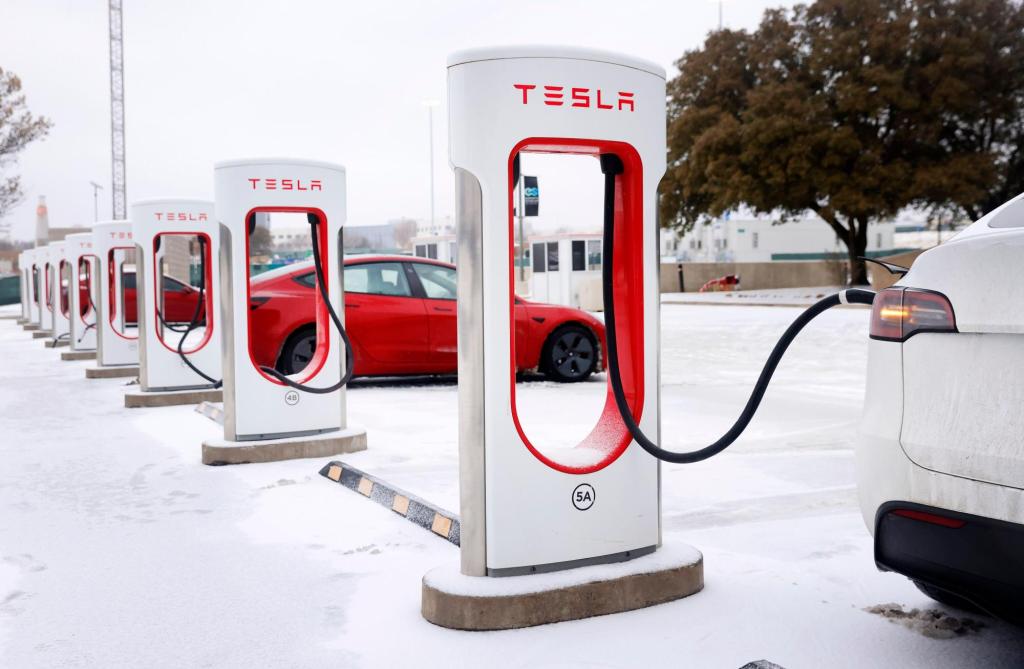
By Chloe Beaver, The Dallas Morning News
It’s a buyer’s market for anyone looking to charge up a used electric vehicle.
Amid record-high inventory, more than half of used EVs are listed under $30,000, according to recent data from Recurrent.
New electric car sales are spiking ahead of the expected death of the EV tax credit on Sept. 30, as buyers front-load EV purchases before tax incentives come to an end. After that, policy will shift its focus to incentivizing gas-powered vehicles, offering loan interest deductions up to $10,000 on qualifying new purchases.
The recent surge in car sales “are unquestionably inflated by shoppers accelerating their electric vehicle purchases to take advantage of Federal EV credits — but the sales pace for non-EVs remains robust, especially given the modest discounts available on those vehicles,” Thomas King, president of the data and analytics division at J.D. Power, wrote in August.
With policy changes afoot, the stakes have been raised for EV makers — particularly for industry leader Tesla, which is struggling to reverse slumping sales. For prospective owners, however, now might be the best time to buy an EV — or to resell one.
‘Influx of new sales’
With interest high, more than 100 EV models are on the market in 2025 with established brands like Audi, BMW, Ford, Hyundai, Mercedes, Toyota and others battling Tesla for a share of the EV pie.
“Pretty much every manufacturer offers an electric vehicle now, whereas before, it was very few and far between,” according to Michael Rhima, general manager at eCarOne.
Until recently, a saturated car market and a generous tax credit of up to $7,500 caused EV leasing numbers to surge to the tune of a 355% spike in 2023, and an additional 88% in the first three quarters of 2024, according to JD Power data.
“You want an influx of new sales because it trickles to the used market,” Rhima said.
Even amid economic uncertainty and EV sales in flux, Steve Greenfield, general partner at Automotive Ventures, said “the cars are coming back.” The trend is likely to continue with 350,000 off-lease EVs expected to hit the used market in 2026.
“The big question will be: What happens to pricing?” Greenfield said.
Bargain deals
In the third quarter of 2025, more than half of used EVs were listed under $30,000 — and 34% listed under $25,000. The lower sticker price boils down to a couple of factors.
One is the 2022 federal EV tax credit to qualifying purchasers of a new vehicle, and a $4,000 tax credit to used EV purchases under $25,000. Rhima said the cost-cutting incentives on new EVs “pushes further down” to the used market.
Another reason is that EVs depreciate faster than gas-powered vehicles, especially in those first few years of ownership.
“Used EVs have a tremendous amount of value because, for the most part, they depreciate pretty heavily from new pricing,” Rhima said.
Rapid technological advancements means the sector gets better and better each year, which is good for offering the most up-to-date technology in the newest car model. But it also puts older EVs at a disadvantage.
“Just like your phone or your TV, every year a new car comes out, it’s got better technology, better battery range, better charging speeds,” Rhima said. “That causes more depreciation than a normal vehicle today.”
More savings in 2026
Greenfield predicts used EV prices will be even sweeter come 2026.
“Dealers will be selling (used EVs) at a lower price next year than this year by probably about the difference in the tax incentive,” he said. Price reductions “might even be more” if supply continues to surpass demand, Greenfield added.
Meanwhile, concerns over battery degradation could explain the dip in consumer demand.
“That’s been a part of the problem is that these EVs depreciate a lot quicker than internal combustion engine vehicles,” Greenfield said — a sentiment echoed by Rhima, who said consumers are “asking a lot about the level of battery degradation.”
He added: “If the vehicle, new, is supposed to get 300 miles of range, after a year and a half, what is the battery life of the vehicle?”
When to trade in
Consumer demand for EVs tends to fluctuate, and Greenfield said it’s likely to shrink after Sept. 30 in the absence of federal tax incentives. That will put pressure on anyone looking to resell, so he advises anyone thinking about trading in their EV to do so before the end of the year.
“If you try to trade in your car next year, dealers are going to be like, ‘Well, I don’t need the car, so I’m going to offer you a really low price for that trade-in,” Greenfield said.
If the car was leased, the loss is on the books of the financial institution — think BMW Financial Services or Hyundai Motor Finance. If the car was financed, Greenfield said, “the consumer gets screwed.”
“Who takes the loss is really whoever owns (them) now,” Greenfield said, advising consumers who want one to do so before the end of this month.
©2025 The Dallas Morning News. Distributed by Tribune Content Agency, LLC.
Originally Published:



